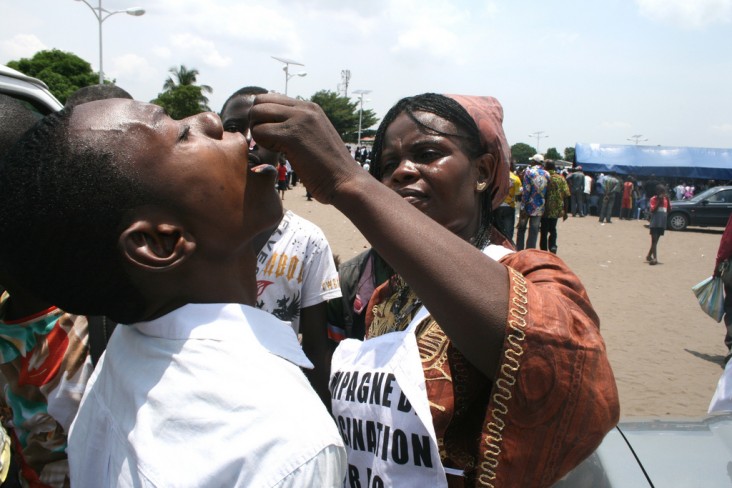
The Democratic Republic of Congo (DRC) was once renowned in Africa for its network of clinics, quality of physicians, and primary health care system. In the past three decades, the political and economic collapse of the country had a dramatic impact on this system. Hospitals and clinics lack personnel and equipment, and often run out of critical medicine and supplies. An estimated 70 percent of Congolese have little or no access to health care. Strengthening the health care system is critical to improving the health of Congolese citizens.
The country has made measureable progress in recent years, due to improved leadership, coordination and investments in priority health issues by the government of DRC (GDRC) and international partners. Between 2007 and 2013, mortality for children under the age of 5 decreased from 148 to 104 deaths per 1,000 live births. Overall, 45 percent of children ages 12 to 23 months received all recommended vaccines, up from 31 percent in 2007. The DRC has been polio-free for over three years, a major achievement given its size and the lack of infrastructure for delivering health services.
Still, the fertility rate in the DRC is 6.6 children per mother, among the highest in the world. The prevalence rate for contraceptives grew to just 8 percent from 6 percent between 2007 and 2013. Nearly 39 percent of women of childbearing age are anemic and 14 percent are underweight. In addition, rates of malnutrition have remained very high for two decades: 43 percent of children under age 5 are stunted, indicating chronic malnutrition, and 8 percent are wasted, an indication of acute malnutrition.
Malaria remains a major health problem. The DRC has the second-highest number of malaria cases worldwide, accounting for 11 percent of the global total in 2013. Malaria is responsible for nearly one out of five deaths of children under age 5, and for an estimated 40 percent of outpatient visits by that age group.
The DRC ranks 6th out of the 22 countries that account for 80 percent of tuberculosis (TB) cases in the world. The prevalence of HIV/AIDS in the DRC is lower than in many sub-Saharan African countries, at 1.2 percent in the general population, but higher in urban areas and among women.
The GDRC has increased its allocation for health in the overall country budget from 3.4 percent in 2011 to 8.6 percent in 2015. For the first time, in 2015, the GDRC set aside funds for essential drugs and contraceptives.
USAID’s health program, which promotes key U.S. government priorities, is the Agency’s largest sector in the DRC. The DRC is a focus country for the President’s Malaria Initiative, the U.S. President's Emergency Plan for AIDS Relief, the Ending Preventable Maternal and Child Death initiative, the Global Financing Facility, and the Global Health Security Initiative.
USAID provides primary health care services at 1,793 health facilities in 78 health zones, serving over 12 million people in seven provinces (Kasai Oriental, Kasai Central, Sankuru, Lomami, South Kivu, Haut Lomami, and Lualaba). It also provides assistance to 103 stand-alone malaria-supported health zones in those same provinces as well as in the Orientale and Kinshasa provinces. USAID’s HIV/AIDS support is concentrated in 21 health zones in Kinshasa and Katanga. USAID’s programs to strengthen the DRC’s fragile health systems are critical for sustaining improvements in service delivery at the national, provincial, and local levels.
- Governance: USAID supports Ministry of Health (MOH) reforms to streamline and decentralize the public sector. USAID also provides technical and financial assistance for the development, implementation, monitoring and evaluations of annual operational plans at the provincial and local levels, and trains communities to identify and solve health-related challenges using locally available resources.
- Supply Chain: USAID improves the availability of essential medicines at all levels of the health system and strengthens national health commodity supply chain systems.
- Human Resources: USAID increases the managerial and technical capacity of health workers and professionals at all levels. USAID career development initiatives include providing scholarships and improving the academic and administrative functions of the Kinshasa School of Public Health. USAID also advocates for the adequate and timely payment of salaries for health care workers.
- Financing: USAID advocates for improved financing for health from the GDRC, leveraging funds from other donors, and finding innovative financing models to improve service delivery and utilization.
- Service Delivery: USAID provides the GDRC’s package of services in selected regions and promotes the health of vulnerable groups -- women, girls, newborns, and children under 5 -- while reducing the prevalence of diseases such as malaria, TB, and HIV/AIDS.








Comment
Make a general inquiry or suggest an improvement.